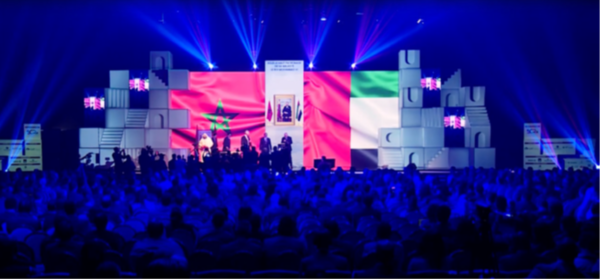The Casablanca Annual Insurance Conference was organised by Federation Marocaine des Assurances this year for two days in April with the common theme “Insurance in a World of Uncertainties”. IUMI was invited to a round table discussion on the practical effects of ESG on marine insurers.
This was the 10th anniversary of the conference which keeps growing and attracts more attention from Europe, Asia, MEA regions and the USA gathering up to two thousand attendees from reinsurance, insurance and brokerage industries demonstrating how important the Moroccan insurance market is becoming.
It was also an opportunity to consider how the Moroccan insurance market faced the terrible earthquake in September 2023 which destroyed the city of Ighil and partially damaged Marrakech. This was Morocco’s largest ever natural disaster killing more than three thousand people and injuring twice as many.
On a much broader and less dramatic note, the marine insurance round table was a signal to remind the industry that Morocco, since the beginning of the century, has become the shipping gateway to Africa with Tanger Med being one of the logistical shackles between Africa and the rest of the world, together with Cape Town in South Africa.
Indeed, the discussions allowed the various participants to explain how quickly ESG principles regarding decarbonisation has been tackled by shipowners looking for new ships and alternative fuels combined with latest machinery technologies to align with the zero emissions target which is set for 2050.
Marine insurers are now facing new risks linked to these fast-growing developments but they are prepared to face the challenge.
We explained the Poseidon Principles for Marine Insurance initiative and the new ETS system now in place in Europe giving a comprehensive picture about the practical consequences that marine H&M insurers are facing and how they encourage and support transitions to fight global warming and GHG emissions.
Artificial Intelligence was described as an energy saving tool, enabling vessel operators to choose the most efficient route and speed, using former ship records in given weather forecast environments.
Some comments were also given on more basic methods to reduce - as much as possible - ship’s fuel and diesel oil products consumption on board by using optimum routes.. Other examples were highlighted to improve ships’ energy efficiency by reducing speed or connecting ships to shoreside electrical power supply instead of using their own fuel for commercial operations whilst alongside.
It was agreed that decarbonisation of the shipping industry to meet new ESG targets also included inland structures such as inland ports.
The round table exchanges went on to consider the Suez Canal situation facing the Red Sea crisis and the group understood that uncertain local geopolitical developments could weaken the anticipated steps towards ESG principles and global warming reduction. But that should not stop our professional IUMI community from working towards this vital strategic target for the planet as a whole.
